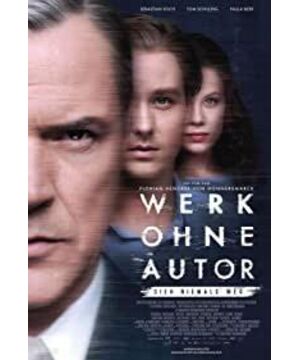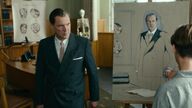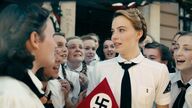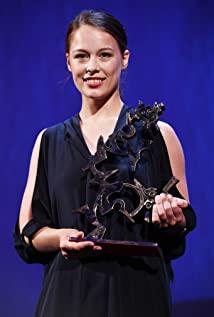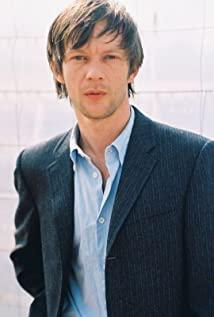The film "No Master" is directed by German director Donasma, starring Sebastian Koch, Tom Schilling and Paula Bell. The film originates from real events and is based on the real life of the famous German modern artist Gerhard Richter. The World War and the division of East and West Germany ended up being the story of a celebrated artist. The film is divided into three time periods as a whole. The male protagonist succeeds in childhood, youth, and middle age. It repeatedly mentions the meaning of "ich" in German and "I", which is also the transformation of the male protagonist's self-knowledge in three different periods. And from the beginning to the end, she was deeply influenced by my aunt's artistic enlightenment. When the male protagonist was unwilling to face the truth, the scene became blurred. This is also the center of the successful birth of the male protagonist's artistic creation at the end of the film. The first part of the film tells about the period from 1937 to 1945, from before the outbreak of World War II to the end of World War II, the childhood male protagonist was deeply influenced by his aunt Elizabeth, and took him to see the art exhibition to let him understand the beauty in painting, music, etc. The Lord planted the seeds of art at a young age and showed his extraordinary artistic talent. At the same time, it tells the unfortunate experience of the male protagonist and aunt in the background, and also shows us the glory and end of the Nazi Party in Germany. The middle part of the film tells the story of the young male protagonist in 1951 who was fortunate to study at the Academy of Fine Arts in East Germany, and met and fell in love with Ellie, who had the same name as his aunt. Ellie's father was the one who made the male protagonist and aunt suffer misfortune. At that time, the art of East Germany was dominated by socialist realism, serving politics, without his own artistic ideas, and lost the ego of the male protagonist. The latter part of the film tells the story of the middle-aged male protagonist and his lover Ellie in 1961, who started life anew after moving from East Germany to West Germany, and came into contact with various innovative modernist arts. At first, the male protagonist lost himself in it. After meeting his most important mentor, the mentor inspired the male protagonist with the story of his own experience, allowing him to find himself again and guiding him to find his own truth. In the end, the male protagonist successfully used painting as a weapon to fight back against Zeng Shi. Father-in-law of the Nazi Party. The whole film develops according to the growth time of the male protagonist, running through two clues, one clue is the artistic development of the male protagonist Kurt, and the other clue is the truth behind the unfortunate encounter of the male protagonist's aunt. The color of the film alternates between cool blue and warm yellow, but the overall tone is unified and harmonious, and the picture is beautiful and natural. There are also many details in the film, such as when Ellie's father appears in many scenes, the image of a skeleton will appear next to it, suggesting the cruelty and cold-bloodedness of the Nazis. The film also uses the method of echoing before and after. First, the male protagonist and the aunt share The places I have been to extend the time and add background music to emphasize it. Second, the same experience that the male protagonist's aunt and lover have the same name and was forced to abort by Ellie's father also echoes the same experience. Third, the male protagonist's father used to be a A teacher who had no choice but to do stair cleaning after the war after joining the Nazi party, but finally hanged himself because he couldn't stand the insult . Fourth, the film begins with the aunt taking the male protagonist to visit the art exhibition, and the film ends with the male protagonist's own art exhibition to echo. Fifth, the aunt asked the bus driver to whistle for her to feel the shock of the sound. The film also ends with the male protagonist asking the bus driver to whistle, echoing each other. This film gives me the following feelings: First, this is a work that combines film and painting art, showing the comprehensiveness and inclusiveness of artistic creation. Second, the film shows the combination of painting and politics. Artistic creation is not only directly related to the artist, but also related to politics, region, environment and other aspects. Third, the mentor's guidance, an excellent mentor can bring students who have lost themselves back on the right track, and constantly enlighten and guide the students on the way forward, becoming a beacon. Fourth, do not forget the self-awareness of the original intention. To create in today's various modern art, it is necessary not only to innovate in thinking, but also to clarify the original intention of creation. Fifth, art can sometimes become a weapon. We don't have to use language to attack, an excellent work of art can become our weapon. Bringing my students back to the right track, and constantly enlightening and guiding students on the way forward, becoming a beacon. Fourth, do not forget the self-awareness of the original intention. To create in today's various modern art, it is necessary not only to innovate in thinking, but also to clarify the original intention of creation. Fifth, art can sometimes become a weapon. We don't have to use language to attack, an excellent work of art can become our weapon. Bringing my students back to the right track, and constantly enlightening and guiding students on the way forward, becoming a beacon. Fourth, do not forget the self-awareness of the original intention. To create in today's various modern art, it is necessary not only to innovate in thinking, but also to clarify the original intention of creation. Fifth, art can sometimes become a weapon. We don't have to use language to attack, an excellent work of art can become our weapon.
(reproduction prohibited)
View more about Never Look Away reviews


